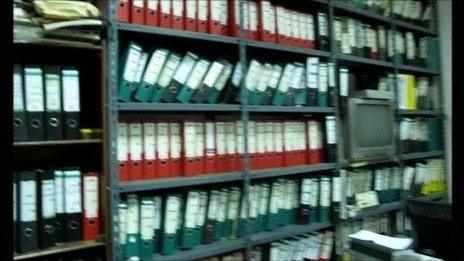Rendition of Abdul Hakim Belhaj
- Published
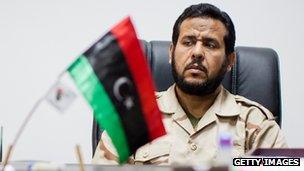
Mr Belhaj was intercepted as he tried to fly from Malaysia to claim asylum in the UK
M16's alleged involvement in the 2004 rendition to Libya of Abdul Hakim Belhaj was approved by the government, the BBC can reveal.
Mr Belhaj is suing the British government, saying it was complicit in his illegal rendition and subsequent imprisonment and torture under Colonel Muammar Gaddafi's former regime.
BBC correspondent Peter Taylor explains.
It seemed to be one of Prime Minister Tony Blair's defining moments: a photo opportunity on 25 March 2004 with Libya's Colonel Muammar Gaddafi in the Brother Leader's desert tent. The setting had been specifically requested by Number 10 "as the journalists would love it". The media circus, with an audience of 60 British reporters, was designed to mark Gaddafi's rejection of his terrorist past and renunciation of his chemical arsenal and weapons of mass destruction. Gaddafi was now hailed as Britain and America's ally in the so-called war on terror.
This remarkable turnaround was primarily orchestrated by MI6's senior counter terrorist officer, Sir Mark Allen, an Arabist who was personally close to Gaddafi and his court - including his head of intelligence, Musa Kusa. It marked the climax of a long career in MI6 that also culminated in Gaddafi providing full details of the 286 tons of heavy weapons, in four shipments, he had donated to the IRA during the previous decade. But he cannot have anticipated the political storm that was later to erupt after the discovery of a message he had sent to Musa Kusa only a week before Blair met Gaddafi.
'Cargo's' safe arrival
Gaddafi and Musa Kusa had already proved they were serious in helping the West against al-Qaeda and its supporters. Sir Mark's message was dated 18 March 2004. The body of it outlined Downing Street's vision of the forthcoming meeting, but the explosive content that was to come to haunt MI6 and the British government came right at the end when he congratulated Musa Kusa on the "safe arrival" of the "air cargo". The "air cargo" was Abdel Hakim Belhaj, the leader of the Libyan Islamic Fighting Group (LIFG) that was opposed to the Libyan dictator.
.jpg)
The letter was found in the bombed intelligence headquarters of Musa Kusa
Britain regarded Belhaj as a terrorist who had met Osama Bin Laden during the Afghan jihad against the Russians in the late 1980s, and whose group MI5 believed was involved in recruiting young British Muslims to fight jihad in Iraq. British intelligence had further reason to be concerned about the LIFG following French and Moroccan intelligence reports that the group had taken part in a secret meeting in Istanbul in 2002 where a decision had been made to attack targets in North Africa and Europe. Casablanca was bombed the following year, followed by the Madrid train bombings on 11 March 2004 in which almost 200 people were killed. That was only a week before Sir Mark wrote his message.
Such was the climate of the time, just over two years after 9/11 when there were real fears of a secondary attack. The terrorist cell in the UK that was planning to bomb a shopping centre and nightclub in London was already under surveillance by the MI5 and the police in an operation code named Crevice. Britain's intelligence services and the CIA would therefore be very interested in the intelligence that any interrogation of Belhaj might produce. In his message, Sir Mark says that Belhaj's "information on the situation in this country is of urgent importance to us".
Sir Mark's message was never intended to see the light of day. But it did in the most remarkable and unfortunate way for MI6 and the British government. It was finally unearthed last year in the rubble of Musa Kusa's intelligence headquarters, flattened by Nato bombs. The repercussions of its discovery are potentially seismic, given that successive British governments have always insisted that they were opposed to illegal rendition and torture and were never complicit in it.
CIA flight interception
At the beginning of March 2004, whilst preparations were being made for the historic rapprochement in Gaddafi's tent, Abdul Hakim Belhaj was in Malaysia. He was planning to fly to the UK and apply for political asylum, thinking that Britain was as opposed to Gaddafi as the LIFG. He had no idea that all was about to change.
I met Belhaj in Tripoli recently, and asked him how he came to be rendered to Libya. He said that whilst in Kuala Lumpur, a friend had called the British Embassy and asked about possible political asylum.
"Perhaps this gave an indication of my presence and this was delivered to the intelligence service which subsequently acted in an attempt to hand me over," he said.
The British Embassy may then have alerted London, and MI6 would probably have tipped off its intelligence partners, including the CIA, that Belhaj was in Malaysia and heading for the UK.
The CIA then planned Belhaj's rendition and intercepted him when his flight stopped off in Bangkok.
"When I entered the flight, I knew that things had been organised for my handover," he told me.
"The last seats in the plane were reserved and the last section was empty of passengers."
He was then flown to Libya on an American aircraft that made a stop for refuelling at an island that he was later told "belonged to the United Kingdom" - probably Diego Garcia, the British overseas territory in the Indian Ocean.
When he finally arrived in Tripoli, he says he was locked up for over four years in the notorious Abu Saleem prison where he was interrogated and allegedly tortured.
'Intelligence was British'
Belhaj's rendition is so sensitive for MI6 and the British government because Sir Mark concludes his message to Musa Kusa by saying that he has no intention of receiving the results of Belhaj's interrogation via the Americans - as the Americans were requesting - as "the intelligence was British". There would therefore appear to be a prima facie case that Britain was complicit in his rendition, despite repeated government assurances that it had never been involved in such operations.
In an interview on BBC Radio 4 last year Labour's foreign secretary at the time, Jack Straw, appeared to be unequivocal. "We were opposed to unlawful rendition. We were opposed to any use of torture or similar methods. Not only did we not agree with it, we were not complicit in it and nor did we turn a blind eye to it." He went on to add, "No foreign secretary can know all the details of what its intelligence agencies are doing at any one time." I spoke to Mr Straw's office and was told he had nothing further to add.
It appears that Sir Mark and MI6 did not act unilaterally. Despite the myths, that is not the way that Britain's intelligence services work. Everything has to be signed off and authorised. As the current Foreign Secretary, William Hague, told me, he signs off - or questions and rejects - MI6's operations "almost every day". In the case of Belhaj's rendition my understanding is that what Sir Mark and MI6 did was authorised by the government at some level.
Abdel Hakim Belhaj is now a senior military figure in the new Libya that Britain helped create and is suing Sir Mark Allen and the government for alleged complicity in his rendition and torture. The ins and outs of what really happened back in Whitehall are currently being investigated by the Metropolitan Police. As a result, the Gibson inquiry into alleged British complicity in illegal rendition and torture has been placed on the back burner. The story of Belhaj's rendition and Britain's alleged complicity in it is far from over.
Watch Modern Spies on BBC 2 at 21:00 BST on Monday 9 April for more on this story.
- Published19 January 2012
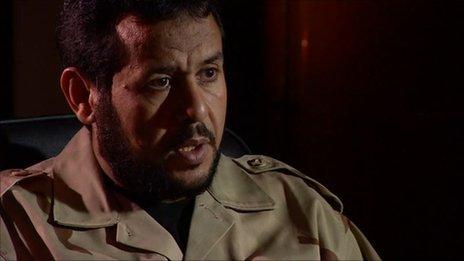
- Published12 January 2012

- Published10 May 2018
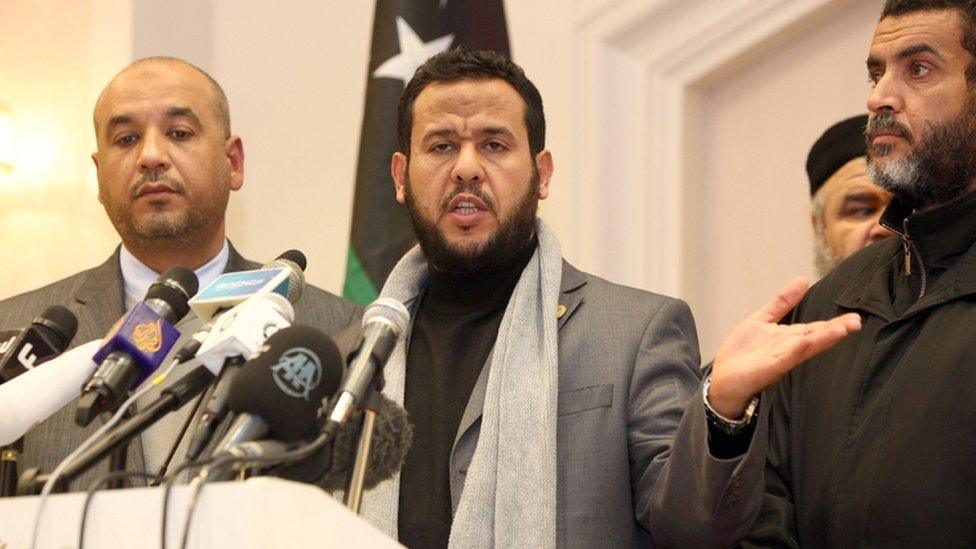
- Published19 December 2011
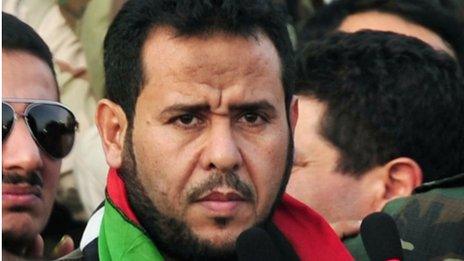
- Published8 September 2011
- Published10 May 2018
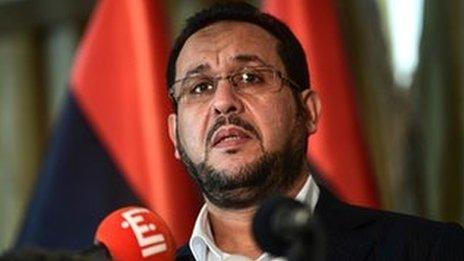
- Published5 September 2011

- Published4 September 2011
